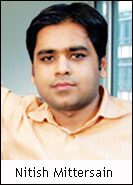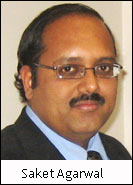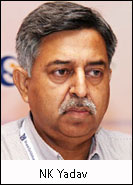Best IT World (India) Pvt Ltd engaged in marketing of computer peripherals under the brand, iBall today announced the launch of mobile phone handsets for the Indian market.
“For the first time in India the iBall brand will launch range of mobile phones under seven segmented categories each having unique characteristics,” Best IT World’s Director, Sandeep Parasrampuria told reporters here.
The handsets will be manufactured in Taiwan and China, but company is also considering setting up a plant in India at a later date, Parasrampuria said.
There are over 700 million mobile phone subscribers in India presently and the monthly demand is over 20 million handsets per month. Annually the demand is set to cross 250 million handsets in India.
Best IT World (India) Pvt Ltd engaged in marketing of computer peripherals under the brand, iBall today announced the launch of mobile phone handsets for the Indian market.
“For the first time in India the iBall brand will launch range of mobile phones under seven segmented categories each having unique characteristics,” Best IT World’s Director, Sandeep Parasrampuria told reporters here.
The handsets will be manufactured in Taiwan and China, but company is also considering setting up a plant in India at a later date, Parasrampuria said.
Parasrampuria said, “We expect to sell 2 lakh handsets per month in Indian market in the price range between Rs 1,250 to Rs 6,000.”
IBall has specifically catered to the senior citizens by launching iBall Senior mobile phones. This mobile has been designed taking into consideration the elders with features like large fonts, amber color, enhanced sound and comes with the remarkable feature of SOS button.
Within 7 seconds of pressing SOS button, the handset sends a siren to alert the surrounding people know that the person is in trouble and should be immediately attended to. It also sends SMS to pre-defined 5 numbers and starts dialling those numbers automatically one after another till one call is attended.
iBall also launched the a slim QWERTY phone in India which is 8 mm in thickness and the company claims that the nearest competitor in terms of thickness is at-least 25 per cent thicker in this and on an average most qwerty phones are 65 per cent or more thicker than this.
iBall enters Indian handset market
Telecom industry cannot afford tariff war in 3G space: Bharti
Bharti Airtel today said there is no possibility of a tariff war in 3G services as operators have shelled out high prices for bagging spectrum.
Bharti Airtel CEO Sanjay Kapoor told reporters here that it was unlikely that there would be a tariff war in 3G space under rational circumstances. “Irrationality can never be explained,” he added.
With the entry of new players, the Indian telecom sector has seen fierce tariff wars eating into profitability of telcos.
Bharti Airtel had bagged airwaves to offer 3G services in 13 out of 22 telecom circles. It plans to launch the service before the the end of this calendar year.
For having a pan-India footprint, Kapoor said the company is in talks with “quality operators who have got 3G” for roaming pacts.Rival Tata Teleservices yesterday launched 3G services with a tariff of 0.66 paise per second. State-run BSNL and MTNL are already offering 3G services.
There were speculations in the market that Bharti will enter into strategic alliance with Vodafone and Idea for rolling out 3G services pan India.
3G mobile services will allow high-speed content download and Broadband services.
Airtel had paid the highest amount of Rs 12,295.46 crore for securing 3G spectrum (radio waves) in 13 telecom circles.
They include Delhi, Mumbai, Bangalore, Chennai and Hyderabad, which account for 21 per cent of India’s data traffic and are expected to have the strongest uptake of 3G services.
Bharti Airtel, which operates in 19 countries, already offers 3G services in Seychelles. It is also running 3G broadband services in Sri Lanka, Jersey and Guernsey.
Dell enters smartphone business in India
Dell today launched two new smartphones in the Indian market. These phones, called XCD28 and XCD35, run on Android 2.1 platform.
Both these phones have specially been designed for emerging markets and have been launched first in India.
Dell has said its target group for the smartphones is both the youth as well as to office-going folk.
Mahesh Bhalla, general manager, consumer and small-medium businesses, Dell India, said that “These phones are powerful enough to handle all shorts of tasks. We will look at selling them to corporates for different use cases like, sales force automation, CRM and ERP etc. Health and education are other areas for which we will look at developing applications.”
When asked about marketing strategy, Bhalla said, “I would like to grow through word of mouth but initially we will have mass media campaigns.”
The company is also planning to upgrade to Android 2.2 once it is available. Bhalla said, “We are looking at a wide range of devices including a Windows Phone 7 device. We have done a lot of customisation based on the requirements of emerging market.”
At a recent international event, Michael Dell had showcased Venue Pro smartphone running on the Windows Phone 7 platform, and the company is expected to launch the device soon.
Michael had said at the event, “Dell is working on CDMA and 4G phones to complement the initial range of GSM devices.”
Dell has also announced that it will extend the ‘advanced exchange warranty’ launched for the Dell Streak to these phones. Under this warranty, customers will be able to exchange phones with manufacturing defects for new ones, without incurring any cost.
Bhalla said, “Under this new warranty scheme, a customer will not have to wait for his phone to be repaired. He will get a replacement for any hardware defect. If it’s a software defect, it will be rectified on the spot or a replacement will be offered.”
The two phones launched today feature a Qualcomm chipset clocked at 600 MHz. Both phones are 3G ready and come with WiFi, Bluetooth, A-GPS, 3.2 mega Pixel cameras, and Active Sync technology.
G’5 mobile to launch 3G handset for Rs 3000
Victor Infotech has tied up with a Hong Kong-based Kingtech Telecom to float a joint venture, Asian Telecom,that has launched five G’5 brand of mobiles in the Indian market and will also launch 3 G hansets within a month.
Akash Bansal, managing director, Victor Infotech said, ” We will launch 3G handset in India by December and it will be priced at around Rs 3000.”
Talking about the joint venture Akash said, “Kingtech Telecom would hold the majority (51 per cent) stake, while the remaining 49 per cent would be held by Victor Infotech and as part of the collaboration, Kingtech Telecom would manufacture the mobile phone and Victor Infotech would be responsible for distribution and marketing of the phone in the country.
He added, “Initially, Kingtech Telecom would manufacture the Indian specific mobile phones in Hong Kong and gradually when the ecosystem develops in India the same shall be manufactured here.”
Victor Infotech plans to take advantage of the Indian mobile phone industry which is expected to grow five-times in the next two years. ASt present, it has mobile handset priced between Rs 800 to Rs 3,000 in its portfolio.
MNP: A catalyst for VAS growth?
In the last few months the Indian telecom industry has been abuzz with news of 3G, Mobile Number Portability (MNP) and BWA. This has LED to lot of excitement and hope among the players in the telecom ecosystem about these services.
On one hand, operators are expecting greater customer retention due to an improvement in the quality of their services while content providers are looking forward to a greater demand for advanced value added services (VAS).
Even the telecom equipment companies are expecting an increase in revenues owing to the need for equipments for faster roll out of 3G services.
While roll out of 3G services has already started, MNP is expected to see the light of the day on November 25.
MNP has generated a lot of interest amongst stakeholders and the popular view is that its implementation will also give a boost to the uptake of VAS.
With MNP the customers will get freedom to change their service providers without changing their numbers, VAS is being viewed by operators as a differentiating factor which can help them grow and sustain in an competitive market.
From the point of view of established operators, VAS will serve as a subscriber retention tool; while for newer entrants, it will become a part of the marketing strategy to attract customers.
If VAS providers leverage these opportunities to tie up with operators, there could be a major increase in the uptake of their services.
MNP is also expected to make VAS providers a stronger player in the ecosystem, with an increase in demand for exclusive and innovative mobile content which will be quite evident after the roll out of 3G.
Nitish Mittersain, chief operating officer, Nazara Technologies, believes that MNP will have a positive impact on VAS. He says, “VAS will be a differentiating factor for operators. They will have to provide differentiating services which will make VAS players a bit more important in the value chain.”
Agrees Saket Agarwal, chief operating officer, Spice Digital Ltd, “Once MNP is implemented, there will be very less, in terms of price, connectivity and service, the telecom players can do. VAS will be looked upon as the key differentiator amongst the major telcos.”
He adds, “We can expect a lot of content and technology based products in the market in the first couple of years of implementation of MNP in the country. The purview of VAS, however, is expected to grow beyond the traditional way VAS is being looked upon in the country.”
Although most players agree that VAS is bound to receive a renewed focus after MNP, some are of a different view. They feel that VAS will not be a pull factor for MNP and quality of service would be more instrumental.
Rajesh Razdan, founder and director, mCarbon, states, “MNP will purely distinguish the quality of the service provider. Prima facie operators will be benefited with MNP. In VAS what happens is that the same service is promoted by all operators, and the subscribers will get an option to choose the operator they want.”
Expectations are that after implementation of MNP the revenue sharing pattern will be skewed towards the VAS providers. Operators would be willing to part with their revenue in order to offer exclusive content to their subscribers in order to retain them.
Currently, revenue in India is shared in an approximate ratio of 80:20 in favour of operators, with VAS providers getting only a small fraction of the telecom revenue pie. Some industry experts say that it is unfair to VAS providers who constantly develop new and innovative apps, while others say that since operators invest a lot in setting up the infrastructure for VAS, it is important for them to gain a greater share of revenue.
Razdan adds, “VAS revenue could see the upside owing to the pressure on operators and VAS companies to increase their bottom lines. With better content being offered by VAS companies, the turf will become open for renegotiation in revenue sharing.”
On the other hand, Agarwal feels that it is too early to predict any changes in the revenue sharing models between VAS provider and operators in the future.
He however adds that, “The revenue sharing models, even now, vary depending on the nature of the product and the understanding between VAS players and the service providers. MNP will surely bring in significant changes in the telecom industry and some strategic changes in the practices in the industry are definitely expected.”
Mittersain too, is hopeful of changing of revenue sharing pattern in favour of VAS providers. He, however, states that the change will take about a period of six months to one year to come around.
NK Yadav, PGM, VAS, BSNL opines that share of VAS in revenues will increase irrespective of MNP implementation.
With launch of MNP nearing, telecom industry has a mixed opinion with regards to its impact on VAS. While some believe that MNP will give a boost to VAS revenues in India, others say that effect will not be a major one.
Market dynamics to decide our 3G tariff: BSNL
State-owned Bharat Sanchar Nigam Ltd (BSNL) which is planning to expand its third generation (3G) services to 120 more cities across the country by December might change its 3G tariff.
Gopal Das, BSNL chairman and managing director, said to Telecom Yatra, “Our 3G tariff is will change depending upon the market dynamics and volume.”
He added, ” Initially we had come with a 3G tariff plan so that people start getting used to our 3G services and now when most of the private players will start offering the services we may have relook at it.”
BSNL, which got the first movers advantage as it bagged 3G airwaves ahead of the private players has only, 1.8 million of its subscribers who use 3G services as of now.
BSNL charges its 3G customers 30 paise per minute for video calls. Apart from that, BSNL also offers data usage at a rate of 1 paisa per 10 Kilobytes (Kb).
The telco has also taken several steps such as improving 3G coverage and launching more value added services to enhance the 3G experience.
Most of the private players, except Tata Docomo, who had bagged 3G spectrum in the recently held auction plans to launch the service by the end of the year. Tata Docomo has already launched 3G in the country from Diwali.
Polycom launches unified communications apps for Galaxy Tab
Samsung and Polycom have announced an agreement to deliver unified communications (UC) solutions for mobile platforms.
Under the agreement, Polycom will develop standards-based video applications to be embedded and distributed on the Android-based Samsung Galaxy Tab.
“Polycom’s differentiated strategy is to deliver innovative UC solutions on partners’ mobile platforms, as opposed to creating Proprietary systems,” said Sudhakar Ramakrishna, Polycom’s general manager of UC products and chief development officer.
He added “Unlike other mobile video applications, we believe the Polycom application will drive a network effect for users and businesses by enabling the Samsung Galaxy Tab to connect with each other, as well as other standards-based tele presence and video conferencing systems and applications.”
Polycom claims that its solution will enable users to participate both in point-to-point and group conversations with HD quality video.
Polycom’s UC core infrastructure can be placed in service provider networks to enable cloud-based UC delivery to consumers and enterprises.
This new solution portfolio is designed to integrate into mobile, enterprise-based room, and desktop systems.
The application will be available on other Smasung smartphones as well. “We are partnering with Polycom to bring standards-based video communications experience to a wide range of UC applications and devices, including the new Samsung Galaxy tablets and Samsung smartphones.” said Hosoo Lee, executive vice president and head of the Samsung Media Solution Center.
Nokia ties up with Hungama for ‘Ovi music Shorties’
Finnish handset giant Nokia has announced ‘Ovi Music Shorties’ in exclusive association with Hungama Digital Media Entertainment Pvt. Ltd.
The offer enables users to download 500 songs in 90 seconds format from the Ovi Music Store. The service will be available on all genres of music only to the Ovi Music users in India.
The availability of songs in a shorter format will help users in quicker and easier downloads, stated the company.
Jasmeet Gandhi, head, OPM and Devices, Nokia India said, “A key trend we have observed is that a lot of consumers prefer to download songs of shorter duration. Nokia Ovi Music Shorties will address this need for quick and easy music downloads.”
The offer will be available for download starting this week and will feature popular songs like All izz well, Aapka Kya Hoga Janab E Ali (Dhanno), Jai Ho etc.
NSE starts mobile trading for registered clients
The National Stock Exchange today said it has started mobile trading for registered clients, a move that would make trading simpler for the customers.
The service will enable member brokers to only go through the regular compliance before facilitating their clients for mobile trading, National Stock Exchange (NSE) said in a statement.
“This is another facility the exchange is providing to the large universe of investors, to make trading simpler and easily accessible to clients on the move. We expect that nearly five million investors would benefit from this move,” NSE CEO and MD Ravi Narain said.
NSE claimed that for the first time an Indian exchange would provide such facility free of cost to its clients, through the brokers who have enrolled for NOW (the software which is being used by a majority of the NSE brokers).
Earlier, just a few member brokers had the option of providing this facility to the clients at their own cost, it added.
In September, the country’s oldest stock exchange BSE, had also launched mobile-based trading.
With the NSE’s new service, the clients will be able to trade in the cash, derivatives or currency market through their mobile phones, while travelling anywhere in the country or abroad.
The clients’ mobile will be connected to the Internet, then to the NOW platform, which is connected to the exchange, it added.
The service will provide a wide range of facilities to the investors where they can see the ‘Market watch’ page on his or her mobile screen. This will display all the available indices and constituents of these indices.
Intex launches IN 2060 V.DO
Intex has today announced the launch of their latest device, which is a video phone, named IN 2060 V.DO.
The IN 2060 V.DO supports two GSM connections and plays MP4, 3GP and AVI video formats.
Shailendra Jha, deputy general manager, Telecom, Intex Technologies (India) Ltd said, “INTEX IN 2060 ‘V.DO’ has been designed keeping in mind the aspirations of Indian buyers who crave for good display quality and broad video-compatibility.”
Other features include a 1.3 Megapixel camera, an-inbuilt radio, audio player, extendable memory up to 8 GB, web camera, Bluetooth with A2DP, Hindi keypad, mobile tracker etc.
Intex has also included ‘Black List’ feature where in a user can block 500 callers.
The phone is available at a market operating price of Rs 2,600.

